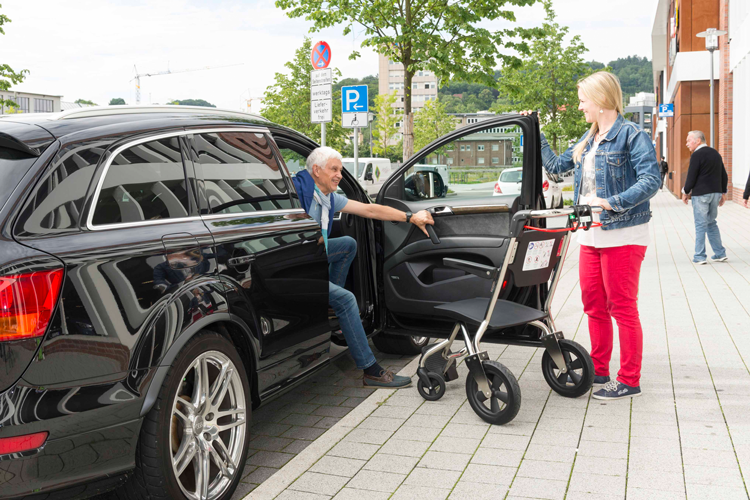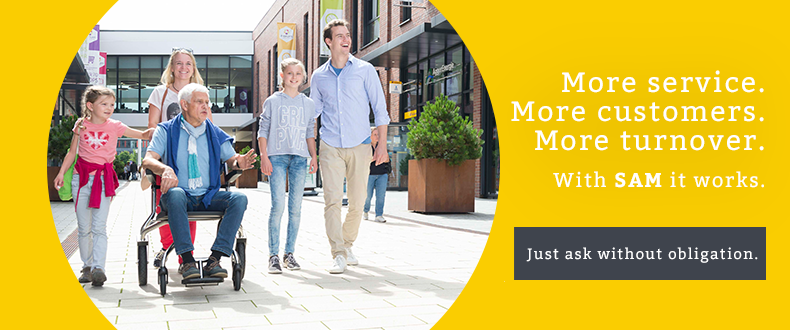German Federal Participation Act: What changes for all those involved?

A self-determined life, participation in and access to public facilities – unfortunately those are not a matter of course for people with disabilities. The BTHG was an important step in 2016 towards accessibility and self-determination. What is behind this legislative package?
An essential fact to start with: People with disabilities can keep more of their income and assets. Which other things change due to the BTHG? And what can you as an entrepreneur do for more accessibility? Find out here.
The German Federal Participation Act: New legislation for disabled people
Many improvements for people with disabilities – that is what the BTHG promises. The extensive legislative package of 28 June 2016 stipulates more participation and self-determination. The following explains which targets and measures this includes.
BTHG item 1: Maintaining the ability to work
The BTHG obligates institutions for rehabilitation measures, such as the Federal Office for Labour or the statutory retirement pension, to identify impending disabilities early on. Even before rehabilitation starts, targeted preventive measures should be used so the affected persons can maintain their ability to work.
The federal campaign “Innovative ways for participating in working life – rehapro” of the Federal Ministry for Labour and Social Affairs (BMAS) subsidizes job centres and the institutions for the statutory retirement pension to trial innovative approaches for maintaining the ability to work.
The objective is to help people with psychological impairments who require extensive support, so chronic illnesses can be prevented from developing in the first place.
BTHG item 2: Easy access to rehabilitation measures
The BTHG also intends to make access to rehabilitation measures easier. Only one single application is now required to receive rehabilitation measures from different institutions. If someone requires the use of a wheelchair, for example, they used to have to make two applications: one with the health insurance and one with the institution for integration support. The BTHG means that this is no longer necessary.
This places the focus on individual support for the person who needs it. The easier applications are supplemented by an independent network of advice centres where people with disabilities and their relatives can get support.
BTHG item 3: Social participation, working life and education
The BTHG also improves the options for social participation as well as participation in working life and education. Specifically, this means:
- Benefits for social participation are re-defined and structured more clearly.
- People can structure their lives individually and according to their personal wishes.
- Support services are named specifically (including support for disabled parent) and accordingly are also subject to the subsidies.
- Through suitable benefits and support, anyone with a disability should be enabled to participate in working life as much as possible and according to their abilities.
- Participation in education is defined as a separate support section.
- Benefits for participation in education also include school and university education which can therefore be subsidized accordingly.
- All-day school education is also included.
Support services can now be claimed for the household as well as when obtaining a higher education degree (e.g. Master). In addition, people with disabilities can work on the free labour market, in a sheltered workshop or for a different service provider. For the first time, this is specifically listed in the law, ensuring legal certainty and clarity.
BTHG item 4: Integration support as an independent participation right
The BTHG also introduced several changes with regard to integration support. People with disabilities who claim integration support can keep more of their income and their assets. This also includes that income and assets of a spouse or civil partner will no longer be taken into account from 2020.
In addition, the burden on local authorities and federal states is eased because some payments for integration support, as well as the basic income support, are covered by the federal government.
The crucial point for integration support is, however, that the payment sum is no longer based on specific types of housing. Instead, the focus is on the individual needs of the individual person.
For the first time, the BTHG considers special benefits for integration support, such as education support and participation in working life, separately from living benefits (including housing allowance, clothing allowance, care allowance). Financing is accordingly also handled separately.
Last but not least, the BTHG also strengthens the right to request and choose of people with disabilities when it comes to the decision for or against certain types of housing. Overall, this has developed the integration support into an independent participation right, rather than just being part of the welfare system of social security.
BTHG item 5: More rights in sheltered workshops
Sheltered workshops will now have a women’s representative. The aim is to improve the fight against gender discrimination and to strengthen the rights of people with disabilities. In addition to this, the rights of the workshop councils were strengthened, which also improved the rights for release and training.
BTHG item 6: Better verification of benefits
The conditions for more effective verification of benefits were also improved. This is to ensure that the contractually bound benefit provider follows their duties. The focus here is on people with disabilities actually receiving benefits from the benefit provider as contractually agreed.
The options for sanctions were also expanded. If, for example, substantial deficiencies are identified in the care for a disabled person, remunerations already paid can be demanded back. In the worst case, the collaboration with the benefits provider will be terminated.
The BTHG in simplified language
Naturally, the rights for people with disabilities also include that legislation such as the BTHG is accessible and can be understood be anyone. That is why the BTHG is also available in simplified language online.
How do you as an entrepreneur benefit from more accessibility?
What does this mean for you now, if you are an entrepreneur or run a business? How can you benefit from the inclusion enabled by the BTHG?
After all, due to demographic change an increasing number of people require support, for example in the form of a walking frame or wheelchair.
And the number of young people with disabilities also has to be noted: They still want to participate, despite limited mobility. Technical progress makes it possible: More and more tools and aids make everyday life easier – and public facilities should be no different. Offering first-rate service for customers, guests or even employees can boost your image and result in recommendations. It can also be good for your turnover.
It starts with public facilities ensuring that everyone can make their way there. This also includes older people or people with limited mobility – whether in the short term through an injury or in the long term due to illness.
A good approach for this is a so-called transfer chair. While it may look like a wheelchair at first glance, it is based on a different concept. The SAM transfer chair from Provita is solely a hire item, is extremely robust and offers optimum operating convenience.
SAM is a great solution for restaurant and hotel owners who want to offer their guests a very special service. The same applies to operators of shopping centres, museums and other leisure destinations.
The transfer chair from Provita is a flexible alternative to wheelchairs wherever people cannot manage longer distances on foot. Even if it is just for a short while after a sports injury:
With this service, you can offer your guests a relaxed and comfortable stay despite their reduced mobility. In addition, it shows that you take issues such as accessibility and inclusion seriously!
As with shopping trolleys, the SAM (“sit and move”) transfer chair can be hired for the duration of the stay. Even whose who might otherwise stay at home now have the opportunity to get out and do something. SAM offers the opportunity of resting while still being at the centre of everything.
Summary of the BTHG and how SAM supports you with its implementation
The Federal Participation Act (BTHG) is an important step towards inclusion. It strengthens the rights of people with disabilities with regard to social participation and participation in working life, allows better access to education and also improves their financial options. Access to rehabilitation measures is also improved as well as the freedom of choice for types of housing.
Independent of the BTHG, managers of restaurants, hotels, museums or other cultural facilities can ensure that people with disabilities will feel at home while visiting. Our SAM transfer chair is a flexible, clever everyday helper for this. People with short-term limited mobility can hire SAM to relax and enjoy their stay with you without exerting themselves. A great additional service!
If you would like to get to know SAM without obligation, we at Provita will be pleased to help you.






